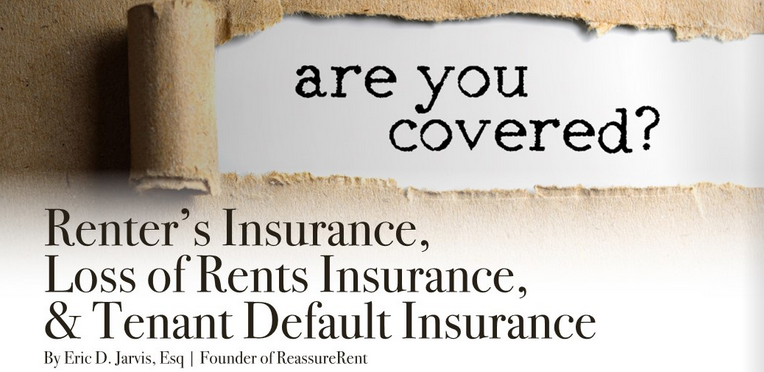
Residential rental property owners face an array of insurance options with similar sounding names, and that seem to overlap. We take three of these, renter’s insurance, loss of rents insurance, and tenant default insurance, break them down, and show which type of protections each of them offers, and who benefits by these insurance policies.
Renter’s Insurance
Renter’s insurance, also called an HO-4 in the insurance industry, is similar to a regular homeowner’s policy. It provides two primary protections. The first protects the renter’s own belongings in case of fire, theft, or damage. The second protection is liability coverage for damage caused by the tenant’s own negligence or accident. This coverage is bought by the renter and the renter is the person insured.
While this coverage is primarily to protect the renter, it does provide some secondary protection for rental property owners. If the tenant’s goods are damaged and the tenant has this insurance, the tenant is less likely to try to blame the property owner for the loss. More importantly, if the tenant should do something like cause a kitchen fire, or allow a bathtub to overflow, resulting in damage to their unit, other units, or the common areas, the renter’s insurance policy will pay for the loss.
Renter’s insurance is very inexpensive, averaging just $195 per year, according to the 2019 California Renters Insurance Guide. All tenants should be encouraged to have renter’s insurance, and you may even be able to require it in your lease agreements.
Loss of Rent Insurance
Loss of rent, loss of use, and rental income insurance are terms used to describe insurance that pays the rental income if the property becomes uninhabitable because it got damaged. The damage to the property usually must be caused by a natural event like fire, hail, or windstorms, but may also include, usually as an option, damage caused by earthquake, flood, vandalism, and tenant damage.
Loss of rent insurance is primarily to protect the property owner. It provides some rental income that would not otherwise be collectible. The amount of rental income may not equal the full rent, however, as insurance companies will typically pay the lesser of your rental rate and the fair rental value of the unit. They may also reduce the payment by expenses that you no longer pay while the property is unoccupied, such as utilities.
This coverage is typically automatically included in the rental property owner’s property insurance policy. If your property is mortgaged, it may even be required by the bank.
Tenant Default Insurance
Also called rent guaranty insurance, tenant default insurance has long been used in the United Kingdom and Australia as a way for landlords to protect their rental income when the tenant doesn’t pay the rent, and has recently become available in California.
Tenant default insurance pays the rental income when the tenant fails to pay the rent. It also pays for the legal costs and fees of an eviction. Rent reimbursement pays the missing rent from the day the original rent was due through the day the property is restored back to the landlord’s possession, usually up to six months.
This protection is directly for the property owner. It typically costs less than one-third of one month’s rent and can be paid for by the landlord or by the tenant. One provider of this insurance has received the support of California apartment owner associations, who see this as a valuable protection for their landlord members.
In conclusion, renter’s insurance is primarily for the protection of the tenant, loss of rents insurance provides rental income when the property suffers certain types of damage, and tenant default insurance provides rental income and eviction costs when the tenant can’t, or won’t, pay the rent. Although they have similar sounding names, each insurance policy provides very different types of protection, and are an important part of any rental property owner’s risk management strategy.

Eric D. Jarvis is the founder of ReassureRent tenant default insurance. Eric is also an attorney, who, prior to his 20 years as an insurance professional, practiced landlord/tenant law in Southern California. Call ReassureRent at (833) 5TENANT (833-583-6268), and visit http://www.reassurerent.com/AptNews.




